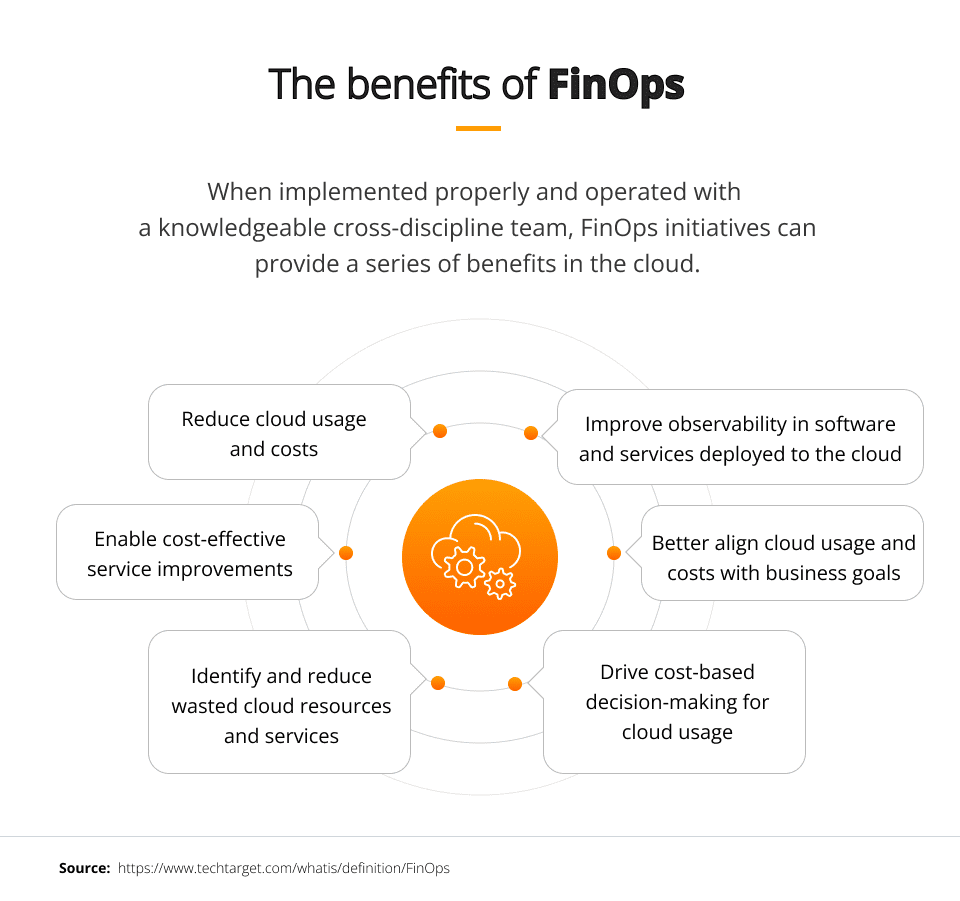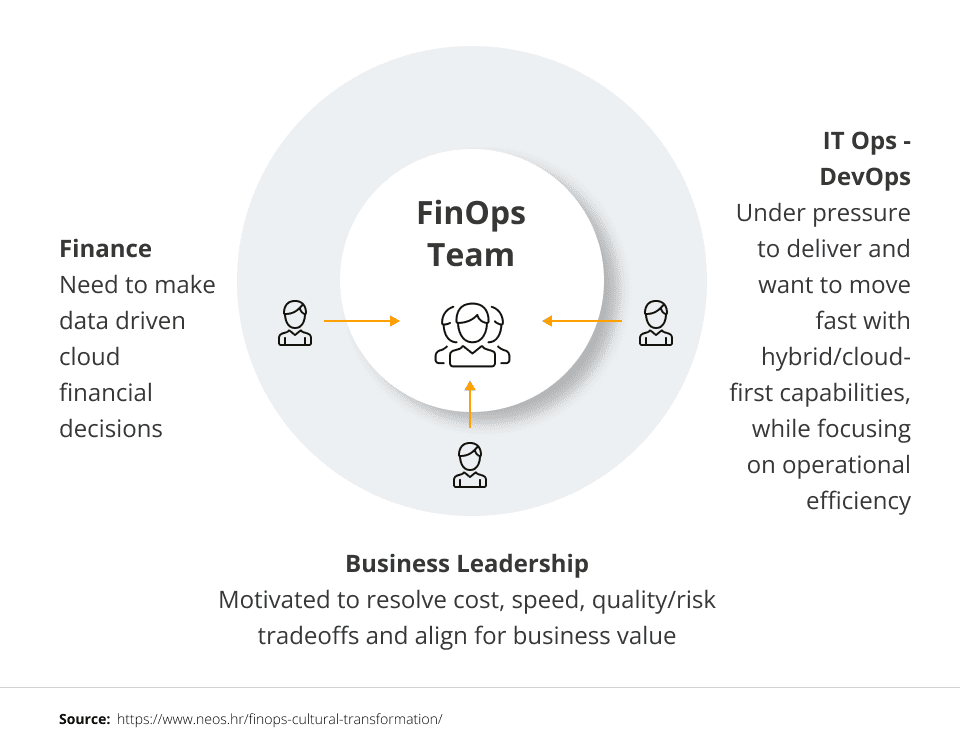
Benefits of a Cloud FinOps adoption in your organization
Ready to revolutionize your cloud spending? Cloud FinOps is the key. This innovative approach blends finance and operations to optimize cloud investments and slash costs. In this post, you’ll find out how Cloud FinOps plays a pivotal role in optimizing financial efficiency and operational capabilities.
Why does every organization need to consider Cloud FinOps?
FinOps, or Cloud Financial Operations, is a set of practices and principles that help organizations optimize their cloud spending and achieve their business goals.
It’s a collaborative approach that involves finance, engineering, and business teams working together to manage their cloud spend and costs effectively.
Embracing FinOps isn’t just about cutting costs—it’s a strategic overhaul. With it, every organization can harmonize finance and operations to make smart decisions.
Bringing finance and technology together has become a necessity. With Cloud FinOps, companies meet dynamic cloud computing needs with pragmatic solutions.
The benefits of FinOps approach
Optimizing cost operations management and resource allocation is just one of the many benefits of FinOps.
A FinOps approach can be beneficial to organizations in a variety of ways, including:
- cloud cost optimization;
- full cost management;
- predictability and accurate forecasting;
- financial accountability;
- enhanced collaboration;
- business agility and scalability;
- improved governance and compliance;
- cultural shift;
- competitive advantage.
Let’s take a closer look at each benefit.
Cost optimization
One of the primary drivers for cloud adoption is cost savings.
Cloud FinOps helps organizations identify and eliminate unnecessary cloud spending, ensuring that they are only paying for the resources they use.
This cost optimization is achieved through a combination of techniques, such as rightsizing instances, leveraging reserved instances, and utilizing cost allocation tags.
Optimization of cloud costs through a continuous, data-driven process is crucial to accelerating digital transformation through the cloud, enabling agility, innovation, and scalability.
Cost predictability and accurate forecasting
Cloud FinOps enables organizations to gain better visibility into their cloud spending patterns, allowing them to make informed decisions about future cloud investments.
By leveraging historical data and predictive modeling, organizations can forecast annual cloud spend and costs with greater accuracy, preventing unexpected spikes in expenses.
The FinOps strategy emphasizes cost predictability and accurate forecasts of wasted cloud spend, serving as a guide to cloud strategy, and fostering an environment of continuous improvement within cloud operations.
Financial accountability
Cloud FinOps fosters a culture of financial accountability within organizations.
By assigning clear ownership of cloud costs to specific teams or departments, organizations can hold individuals responsible for their organization’s cloud spending and expenditures, promoting more efficient resource utilization.
Beyond traditional cost tracking, FinOps introduces a strategic framework where every financial decision resonates with operational objectives.
This method provides a meticulous lens into cloud expenditures, and business value realization encouraging transparency and accountability within organizations.
Enhanced collaboration
Cloud FinOps promotes collaboration between cloud providers and various teams within an organization, including finance, IT, and engineering.
This cross-functional collaboration breaks down silos and ensures that cloud decisions are aligned with both business and financial objectives.
The FinOps approach shines as the catalyst for enhanced teamwork. This methodology doesn’t merely streamline costs; it cultivates a culture where finance and operations synchronise seamlessly to accelerate business.
As teams align around a common fiscal strategy, decision-making becomes more cohesive and proactive.
Business agility and scalability
Cloud FinOps enables organizations to respond quickly to changing business needs without being constrained by traditional IT infrastructure limitations.
By leveraging the elasticity of cloud resources, organizations can scale their cloud environments up or down seamlessly, optimizing costs and supporting business growth.
With FinOps, organizations not only optimize costs but also achieve a level of agility that is crucial in the ever-evolving cloud ecosystem. Scalability, once a challenge, transforms into a strategic advantage.
Improved governance and compliance
Cloud FinOps helps organizations adhere to industry regulations and internal governance policies around cloud consumption.
By establishing clear cloud governance frameworks and implementing automated compliance checks, organizations can mitigate cloud-related risks and ensure compliance with data privacy and security standards.
The benefit lies in cloud cost optimization and the enhanced governance structure that ensures financial controls seamlessly integrate with operational protocols.
Cultural shift
Cloud FinOps promotes a cultural shift towards cloud utilisation within organizations, encouraging a mindset of cost-consciousness and financial responsibility among all employees.
This cultural transformation empowers individuals to make informed cloud usage decisions, further contributing to cost optimization.
Embracing the business value side of cloud FinOps transcends traditional financial practices, fostering a dynamic environment where every stakeholder becomes attuned to the strategic alignment of financial decisions with operational objectives.
The value of cloud FinOps is not just fiscal; it’s a catalyst for a more agile, collaborative, and forward-thinking corporate culture.
Competitive advantage
In today’s competitive business landscape, organizations that effectively manage their cloud costs can gain a significant advantage. By optimizing cloud spending and aligning their cloud infrastructure investments with business goals, businesses have the ability to free up resources for innovation, product development, and market expansion.
The agility and precision derived from a FinOps approach not only optimize costs but position businesses at the forefront of innovation, providing the crucial edge needed to navigate and excel in today’s dynamic and competitive business environment.
How to start a Cloud FinOps journey in your organization
An effective Cloud FinOps journey begins with a strategic roadmap.
A meticulous cloud migration plan is the first step. Your first step in implementing Cloud FinOps in your organization should be to identify your organization’s specific needs, considering scalability and security.
To determine which cloud service providers are best suited to your needs, compare cloud providers extensively. Don’t just look at features; delve into performance metrics and service-level agreements.
Upon migration, the focus shifts to precision: the essence of cloud cost optimization.
Analyze usage patterns to identify areas for efficiency improvements. Make real-time adjustments based on fluctuations in demand, maximizing resource utilisation.
With a well-defined strategy in place, your organization can embark on a dynamic, cost-effective journey to Cloud FinOps.
By adopting a Cloud FinOps approach, organizations can maximize the value of their cloud investments, reducing costs, enhancing agility, and improving business outcomes.
Invest in Cloud FinOps today to gain unprecedented efficiency and transparency in your financial operations.






